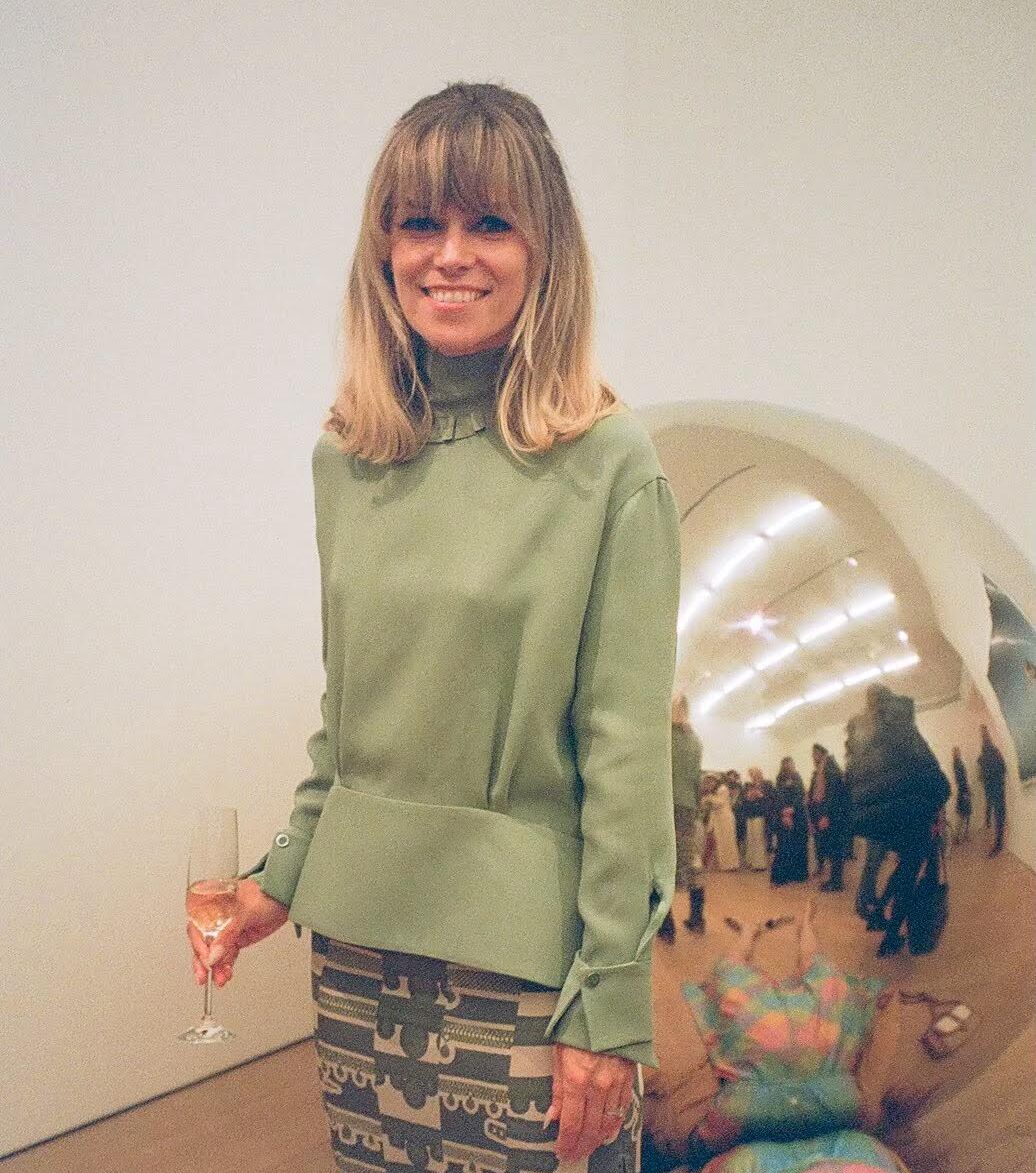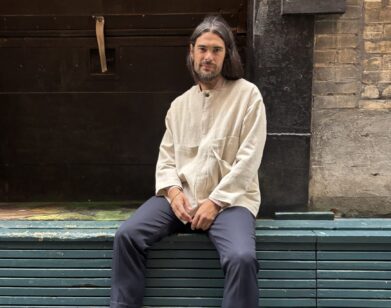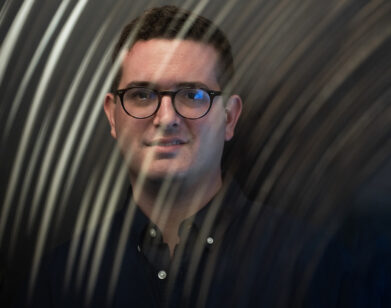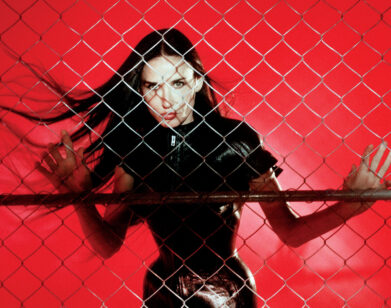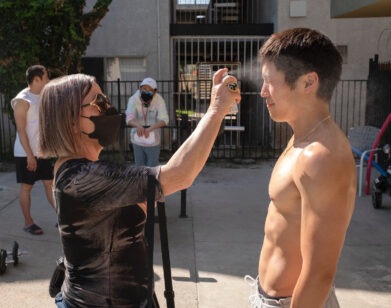MULTIVERSE
Daniel Kwan and Alex Prager Talk Prophecies and Practical Effects
After seeing the “weird as hell” short Interesting Ball, the iconoclastic visual artist Alex Prager slid into the DMs of Daniel Kwan, one half of the mononymous moviemaking duo the Daniels, who directed the film. Fast forward nearly 10 years, and Prager and Kwan have developed a friendship and are still making weirdly wonderful work, albeit on a larger scale. Kwan and his creative partner Daniel Scheinert are among the hottest directors in Hollywood with their heartfelt, dizzyingly colorful take on the multiverse, Everything Everywhere All at Once, poised for a big night at the Academy Awards. Meanwhile, Prager just debuted her twelfth short film Run at SXSW, her very first festival screening. Fitting, given Prager and Kwan’s shared affinity for bringing life to inanimate objects, the unconventional protagonist of Run is a giant mirror ball, one that wreaks quiet havoc on a retrofuturist dreamscape that Prager often returns to in her richly-hued oeuvre. Three days before Kwan, a strong contender for Best Director on Sunday, hits the red carpet at the historic Dolby Theatre, he hit up his friend Prager for a chat about psychic prophecies, their love of practical effects, and his EEAO-inspired Oscars look.
———
PRAGER: Hi.
KWAN: How’s it going?
PRAGER: Good. Thanks for doing this.
KWAN: Of course. I was very excited when you invited me. I am a little tired but I think I’ll be okay. Where are you in the world right now?
PRAGER: I’m in Paris. I’m staying in my favorite hotel.
KWAN: Looks very sexy back there. That’s a nice-looking rose gold behind you.
PRAGER: Do you have your Oscars outfit picked up?
KWAN: I got something figured out, it’s still being made. There’s a local Asian-American shop that is making me a custom tux based on a costume from our movie, so it should be fun.
PRAGER: Oh, wow. I can’t wait to see it.
KWAN: You know the punk sweater from the movie with embroidered flowers? We’re just basically doing that on a tux.
PRAGER: Oh my god, I love it.
KWAN: What’s new? What’s going on? Last time I saw you, it was like a month ago or something in New York briefly.
PRAGER: Was it a month? I lost track of time.
KWAN: It feels like five months ago.
PRAGER: Yeah, but it’s been just as cold. I was in Croatia shooting. And now I’m in Paris editing. So, it hasn’t gotten warmer yet for me.
KWAN: Very fun. I just did a photo shoot for the first time actually a couple weeks ago for—
PRAGER: The cover of W?
KWAN: Yeah, exactly. It was my first time doing one.
PRAGER: I love that.
KWAN: They reached out to us and we couldn’t say no because it was such a cool opportunity. But then the other directors they reached out to were Steven Spielberg and Todd Field. [Laughs]
PRAGER: [The photos] were terrific. So you.
KWAN: I know, but also definitely influenced by your style as well.
PRAGER: You just reminded me to ask you, why is it important for you to shoot everything practical? Because I know your photo shoot for W was all practical and there’s a lot of that going on in Everything Everywhere [All at Once].
KWAN: We could both just talk about this for a while. The first answer is just selfishly, it’s way more fun. I’ve done the green screen shoots and they don’t feel like filmmaking to me. That’s not why I got into this. And that’s not what I was doing when I was younger. Doing things practically, it’s fun for the crew, it’s fun for the actors. But it also bleeds into the creative. You can tell in the performances, doing things practically leads to surprises. You don’t know what’s going to happen. With CGI, you get this frame-fuck. That’s the term we use in filmmaking where you can just perfect things to such a point where they no longer feel real. They just feel so contained in a way that practical effects will never feel. I think people are beginning to embrace practical stuff again. I’m very excited to see a new generation rediscovering how wonderful practical effects can be. So much of your work deals with artifice, and yet there’s still so much emotion. And I’m wondering how you came across that style? And what about artifice are you drawn to?
PRAGER: The world is so full of imperfections. My emotions have always been and still are constantly changing. And when I experience unexpected things in life, I can switch into this kind of disquieting place where I don’t totally know what I’m looking at, I can’t understand it quickly. That’s exciting to me because then I’m really living, and there’s something on the other side of it for me to explore.
KWAN: I went to your showing in Chelsea, it feels like a couple weeks ago. And one of the pictures that they had up displayed was one that is in Run. It’s the one with the lady who’s falling from the sky. And there’s this one detail that I wanted to ask you a question about it because it has to do with this. It’s Mary Suspended Between Heaven and Earth, which has such gorgeous colors. But the thing that I love is there’s a Band-Aid on one of her legs. Because there’s the defined, formal image of what a thing is supposed to be. And then you add one little fuck up and it opens up a whole crack of curiosity to the rest of the story. Things like that I find so interesting. That just makes you lean in. And where does the Band-Aid come from? Is that determined at the very beginning? Or you discover it on set?
PRAGER: So, for Mary Suspended between Heaven and Earth, she was always meant to wear the Band-Aid. I conceived the Band-Aid before I conceived Mary.

Mary Suspended Between Heaven and Earth, 2022 59 X 42.5 inches, Alex Prager. Courtesy Alex Prager Studio and Lehmann Maupin, New York, Hong Kong, Seoul and London.
KWAN: See, I saw that. But you would never notice it unless you went and saw it at the gallery. Which is why one of the things I love about your work is the scale of it all. This might be really esoteric but I love talking about scale and art. And we’re going through an identity crisis right now. Figuring out like, “Oh, how important is theatrical? Should people watch movies on their iPhones?” I know where I stand, but your work really sings when you get to go see it the way it was meant to be seen. How much of that is factored in your process while you’re making things?.
PRAGER: Yeah, I think it becomes something else when you see it in a different medium. When you watch something alone in your room on the computer, you’re going to experience it totally differently. You’re going to be able to fast-forward or pause and look at your phone to send a little tweet. And you miss things. Sometimes I even get nervous when I go in to watch a movie with a bunch of strangers. I get nervous about what I’m going to feel when I’m around all of these people I don’t know. It gives me a physical reaction just walking in and sitting down and waiting for the movie to start. I get butterflies. I don’t get that at home when I’m by myself.
KWAN: Is that a good thing? Is it addictive? Do you like the butterflies?
PRAGER: Yeah. People used to design movie theaters like people would design cathedrals. And for good reason, to me and to you I’m sure, they deserve that kind of—I’ve lost the word.
KWAN: Hmm—
PRAGER: Rapture! That’s the word.
KWAN: Yes. It’s an all-consuming rapture when it’s done right. They’ve done studies to show that when you are looking up, you’re activating the parts of your mind and your spirit that connect to something bigger. The spiritual parts of your brain are activated when you look up. Like when you go to the Sistine Chapel, you are physically activating the parts of your spiritual self.
PRAGER: I totally believe that you’re giving yourself up to the experience.
KWAN: You’re looking at the stars. Seeing your photos and your prints in person, you feel the scale of it. Especially I love the shot of everyone lying on the floor; such a fantastic, bizarre image. It works so well when your full field of vision is consumed by it. Or when you go to an IMAX theater, the same thing. You feel like you’re at the Sistine Chapel.
PRAGER: I’m curious, how much improv plays into your work? Because I feel like everything has to be so meticulously planned for all the stunts and everything that you’re coordinating all the time.
KWAN: So much of our work is this weird combination of meticulous planning and improv. My directing partner [Daniel Scheinert] started in an improv troupe, so that’s his expertise. He loves chaos. I came from animation, so I’m always looking to have things under control. But there’s only so much you can plan before you run out of time or money. So, we plan as much as we can, and really all we’re doing is setting up boxes, environments.
PRAGER: Do you find those boxes in rehearsal or actually on the shoot day?
KWAN: A little bit of both. Michelle Yeoh flew in the weekend before we started shooting.
PRAGER: Oh my god.
KWAN: There was no time to rehearse this movie. All we could do was have Zoom calls with her. And Stephanie Hsu, we would do a couple rehearsals because she was in town. We really only met with Ke [Huy Quan] once. But we never actually had a whole family rehearsal with the whole cast except one read-through. Every actor also requires a different process. And for Stephanie Hsu, obviously her character was like, “We want to give you the biggest box possible. Run free. Let’s have a lot of fun.” Whereas a lot of the really technical stuff with Ke or Michelle had to be really planned out, because they really don’t like improv as much as Stephanie. We have the ability to do both, and that’s the secret sauce of our films.
PRAGER: And speaking of boxes, do you ever get worried about boxing yourself into a certain expectation for the types of movies that you make?
KWAN: Oh my god. Yeah. I mean, I felt it really strongly when we were first doing music videos. And even still, we found some success early on. And within three or four, I could feel myself worrying, “Have I codified a brand or a voice too quickly? How do I break out of it?” Sometimes that impulse will be, “Let’s go against type, let’s go against expectations.” But then you can swing too far the other direction and it doesn’t feel like you.
PRAGER: I tried that too. It’s hard to find the balance. It was interesting. At the time, I was like, “Oh my god, this is the best work I’ve ever made.” And then six months later, I was like, “That was a weird phase, but I needed to go through it.”
KWAN: Do you think you figured out who Alex Prager is?
PRAGER: I actually came back and had a whole new appreciation for why I appreciate this aesthetic I developed. And now, I’m doubling down on trying to mix time periods. I always want to leave people guessing. Are they in the future? Are they in a parallel universe? Or are they in this multiverse of time periods that we all have a collective memory of?
KWAN: That’s fascinating. I think about this just because yeah, we’ve been doing this for about 12 or 13 years. I keep wondering about what it means to evolve as an artist, and who has done it gracefully. Questlove was a big fan of our movie. We met him at one of these events and one of his pieces of advice that he gave us was, “Don’t do the pivot album.” As a musician, you have a big smash-hit album and everyone loves it. And then the next album, you pivot away and you kind of destroy your goodwill and what everyone loved about the first thing because you’re trying to stretch yourself out in other directions. I don’t know what that’s going to look like for us right now. The amount of expectation that is going to go into our next movie is terrifying. Other filmmakers have told us, “Whatever your follow-up movie is going to be, the reviews have already been written. No matter what you do, everyone’s going to be comparing it to Everything Everywhere. And they’re going to say it’s not as good. Now that you know that, free yourself of expectation. Make whatever you want.”
PRAGER: I guess we just have to trust what we love, because we’re always evolving. We’re always exposed to new challenges and new questions. So, as long as we’re honest about what those questions are and we put it into our work then we just have to trust that it’s going to represent who we are in a new stage in our lives each time. I have to make art partially because it’s the only time I feel like I am the best version of who I am. I feel almost invincible. The only reason I need a body in that moment is to be able to communicate with the physical universe that I work with. I become this ball of energy that’s just operating on a different level. And I don’t get that really any other time in my life. Is that crazy?
KWAN: No, no, no. I think that’s a common thing. If that didn’t happen to you, you would have quit this style of photography a long time ago, because it’s so much work and it’s so hard and so stressful. I know a lot of filmmakers who feel very alive on set in a very strange way, the adrenaline and the emotions. It is a very spiritual experience if you are especially connected with the people around you. One of my favorite things that my wife says when she comes to visit me on set, which isn’t often—she’s very busy—but when she does, she thinks I’m so hot. I feel like a different human being. Do you feel sexy on set? That’s a dumb question. Don’t answer that.
PRAGER: [Laughs] I think my husband thinks I feel I’m sexy on set, but I feel no sexuality on set.
KWAN: Exactly, exactly.
PRAGER: It’s like I’ve hung my body out to dry. Everything else is on pause except for what I’m doing.
KWAN: Well, there’s nothing sexier than the egoless creation.
PRAGER: But afterwards, that’s another story.
KWAN: The comedown is real.
PRAGER: Wait, when did you realize you wanted to be a director?
KWAN: Very late in my life, honestly. I knew back then, directing is very hard. The career path is really difficult. The chances of success felt impossible for someone like me. I grew up in Massachusetts so far away from the industry, so I wrote it off. My mom suggested it. She’s like, “You should go to film school.” And I was like, “Mom, you’re crazy. You don’t know how hard that is.” But she knew that I loved writing, I loved music. I was in a punk band in high school and she knew I was a photographer.
PRAGER: Wow, what a cool mom.
KWAN: I know. Well, there’s two sides of the story. First, my mom was open enough to be like, “I can tell that my son will not succeed in anything except the creative world.” And also, she was someone who wished she could have gone into a creative field but ended up not having the opportunity because of the generation she was a part of. And so, there was that part of the story. But then also, apparently when I was really young, a Christian soothsayer prophet who was a friend of a friend came up to my mom and she pointed at me and said, “One day, your son is going to be a famous film director.”
PRAGER: What?
KWAN: And implanted the seed in my mom’s head. And she said, “He’s going to become a famous film director and he is going to spread the word of God.”
PRAGER: Oh my god, that’s amazing.
KWAN: And my mom kept that away from me. She didn’t tell me that until after I had gone to film school and started actually doing well. And my dream is one day I want to bump into this prophet just to be like, “What did you see? How did this happen? Is this a self-fulfilling prophecy?” I think about this now a little too much.
PRAGER: Of course!
KWAN: Especially the last part because it’s spreading the word of God. It’s so funny. I left my faith not too long after college but that part, I’m just like, “I wonder what that’s going to look like.” The definition of god is changing.
PRAGER: God can be very broad.
KWAN: Exactly. Are there any pieces of artwork that are really inspiring you right now? What kind of stuff are you taking in at the moment?
PRAGER: God, that’s a good question. I didn’t go to any of the fairs recently. I’ve just been looking at the same old stuff that I love. I mean, my sister just had a show, Vanessa Prager.
KWAN: Oh, that’s so fun!
PRAGER: In Los Angeles. So, of course, I’ve got to mention that. She’s doing these huge textured oil paintings of people in orchards where they’ve become bouquets of flowers.
KWAN: That’s great.
PRAGER: I think we probably need to wrap it up soon. But I wanted to mention that we both love balls because we both had movies featuring a ball as a protagonist. Not a question, it’s just a statement.
KWAN: That is a statement. This is my little fidget spinner. It’s a little ball. I don’t know if you can tell but it actually spins. I love it. I love objects. [In EEAO] we have the dumb bagel thing that just stuck. We have the rocks, too. I just think inanimate objects are a very interesting empathy challenge. The mirror ball is the perfect vessel for chaos, because it’s so ominous and beautiful. Speaking of, the first time you reached out to me was when you saw Interesting Ball, right?
PRAGER: Mm-hmm.
KWAN: You just DM’ed me randomly so long ago. I was like, “This is so funny, of all the things.” I’m glad you like it, but it’s weird as hell.
PRAGER: I mean, that’s honesty, right? You can say or do anything in the moving picture as long as it’s representing what’s in your heart. And clearly, your heart is just very radical. It’s got so much comedy and also darkness. And it really represents what it is to be human today.
KWAN: Thank you so much. I feel the same about your work. What you do is just iconoclastic. It just breaks all these rules but it’s executed at such a high level. You feel the weight of it. And then at the same time, you feel the artifice and you feel the soft humanity underneath it all.
PRAGER: Speaking of humanity, you’re also such a kind and gentle person. And I appreciate that.
KWAN: Oh, Alex, thank you. I love talking to you, even though I feel like we’ve only really had four conversations ever but it’s still—
PRAGER: I know. But we’ve had conversations through each other’s work, too.
KWAN: I do have a couple of your books here on my bookshelf, so you live in my subconscious.
PRAGER: I love that. Thank you Daniel.
DANIEL: Thanks, Alex.

